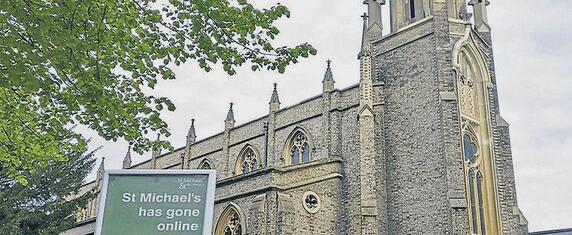July’s EN article.
THE PC CHURCH
There is a lot of talk in the general culture about the ‘new normal’ in society. Will city centres, tourism, flying, mass sports events ever go back to what they were? What about universities and schools? Will we become a less engaged society – permanently afraid of other human beings, except when they exist in avatar form on the Internet? And what about the church? What will the PC (Post-Covid) church be like?

Like the rest of society we have experienced negatives and positives out of this crisis. Sometimes we think that we are not like the rest of society, but the wider cultural trends tend to invade the church far more than we think – especially if the church has already been mirroring those trends. There are particular aspects of the ‘new normal’ which will I think be widely reflected in the church.
Cyber Church?
When we changed to online church – there were those who immediately hated it, there were others who loved it and saw it as the future and many I think just went along and hoped it would not be for too long.
Several weeks into this new way of doing church, there are some things that are positive and others that suggest a worrying trend. Most churches started online with a bang. Many of them have slowly gone downhill since then – as the novelty has worn off and the variety of offerings available have increased.
One survey in the US suggests that 40% of regular churchgoers are not attending online. Habits are hard to break – once people get out of the habit of going to church, then they get into the habit of not going. The message that ‘church’ is an optional extra was already an increasing one – this may accelerate that process.
What about all the new converts/contacts through our online activities? Again the evidence for that happening is not really there. There will of course be some. But I have spoken to people who are really excited that their congregation has gone up fourfold. ‘We used to get 100 people in our building – now we get 400 online.’ That’s wishful thinking. The 400 ‘attending’ include those who pop in for 30 seconds, great Auntie Bessie visiting from Canada, and those who have it on in the background whilst they play on their phones, do their knitting, or catch up on their e-mail. We may find that our rush into disembodied church is going to make it harder to re-incarnate the Body.
On the other hand there is no doubt that there has been a great deal of creative use of technology. Perhaps things will never be the same? In my view the cyber church can never replace the gathered church. We are incarnational.
The very word ‘church’ has the idea of the gathered ‘assembly’ (as anyone from a Brethren background will know!). It has nothing to do with the building (which is a useful tool) but everything to do with publicly meeting together, whether in a designated building, or a home. You cannot have cyber baptism, cyber communion or cyber greeting one another with a holy kiss. Cyber sung praise is almost impossible – and even cyber preaching misses out on the dynamic of the interaction of beings who are more than disembodied spirits or minds!
Cyber Evangelism?
But we can use technology to help those who are unable (as opposed to unwilling) to gather. We can use technology as an aid to our worship – just as we use electricity, so we can use videos and recording. But most of all the Internet is the modern day equivalent of the Athens market place (it is also the brothel, the debating chamber and increasingly the academy). It is a place where we should be – and a place where we can communicate the Good News. We need to think about how to use cyber evangelism – and not just leave the market to the heretics, the greedy and the purveyors of false wares.
Christian Consumerism
Another possible good that may come out of this crisis is the lessening of Christian consumerism. Do we really need to fly the world and have ever-increasing conferences in glamorous venues with the ‘best’ speakers and the celebrity bands? There are churches that say they cannot operate with a 100 restriction because once they factor in staff, worship band, tech people, stewards, etc., that’s half the quota. How did we get to a stage where we can’t meet together without all the tech and people? Maybe a more simple approach will be necessary – and helpful.
I also wonder if churches will of necessity become smaller and more local? Perhaps the coming financial recession will also ensure that churches downsize in terms of staff and facilities?
But most of all this is what I hope for. Covid-19 has shaken the world, but it will also shake the church. If it causes us to return to the basic ecclesia then, who knows, it may end up being a real blessing. When our hope really is ‘in Christ alone’ we will be in a much better place to offer hope to a world which is so desperately in need of it. Sometimes Christians talk of a desire to go back to being the New Testament church – maybe now we will have no choice.


Yes – there is uncertainty with moving forward and for many comfortable with the previous “normal” and systems and structures it may be an uncomfortable uncertainty – painful and threatening even. For others who perhaps have have a creative inclination it might be an existing time with new possibilities opening free from previous institutional restrictions.
“Wider cultural trends tend to invade the church”, yes and if the main decider of action is avoiding being offended in favour of what is comfortable then what place is there for the offence of the Gospel of the Lord Jesus Christ in the church? I suspect that difficulties such as Covid-19 and racial tensions have shown and will show up what elements of the church are motivated by comfort and what elements by Christ and obedience to him.
I recently read an article which described David Robertson’s account of how, waiting to speak at a conference abandoned his prepared speech and gave his testimony of a quite miraculous recovery.
I cannot remember where I read it. Can you help me?
The article is here – https://theweeflea.com/2015/01/01/the-shelter-of-the-most-high-new-year-old-hope-a-personal-testimony/